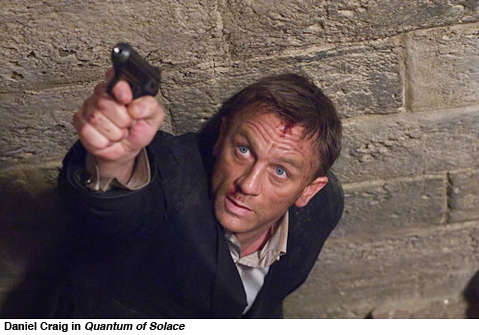Quantum of Solace: James Bond vs. imperialism
By Hiram Lee
3 December 2008
In Quantum of Solace, the twenty-second “official” James Bond film, Daniel Craig returns for his second performance as the suave British master spy. The latest Bond film is directed by Marc Forster (Monster’s Ball, Finding Neverland) with a screenplay written in part by Paul Haggis (Crash, In the Valley of Elah). Quantum is a direct sequel to Casino Royale (2006), the film which “rebooted” the series, revealing how Bond received his “Double O” status and following his first mission as Agent 007.

The new film begins where the last ended (See “Casino Royale: the new James Bond film” .) Bond has captured the nefarious Mr. White (Jesper Christensen) and, following a car chase and shoot-out, has succeeded in bringing his prisoner to MI6 chief M (Judi Dench) for interrogation. While preparing to torture Mr. White, James Bond and his colleagues at MI6 are given information about a secret organization called Quantum. The group has infiltrated MI6, planting a Quantum agent as personal guard to M. Following up on the Quantum infiltrator’s financial contacts, Bond goes to Port Au Prince, Haiti and poses as one of Quantum’s henchmen.
He soon uncovers a plot involving renowned philanthropist Dominic Greene (Mathieu Amalric) of Greene Planet whose environmentalist charity is a front for Quantum’s activities throughout the world. Greene plans to launch a coup to reinstate Bolivian general and deposed dictator Medrano (Joaquín Cosio) to power. In return, he orders the general to sign a deal in which Greene will control a large section of Bolivian land and any resources discovered there. Greene, of course, already knows the value of the land and that he and Quantum can exploit its natural resources to turn a profit and become the true owners and rulers of the country.
In pursuing his coup d’état, Greene will collaborate with the CIA, which guarantees the success of the regime change on the condition that Greene provides the US government with a sweetheart deal regarding any oil reserves discovered under his new land acquisitions. Greene will also impose certain conditions of his own; the CIA, he declares, must eliminate James Bond.
In spite of being the second installment in the “rebooting” and reimagining of the James Bond series, Quantum of Solace follows more or less the tried and true formula of most films in the series. There has been a noticeable effort, however, to undo some of the mythology, or at least to remove some of the camp of the earlier works. Gone, for the most part, are the beloved spy gadgets typically at Bond’s disposal. The trademark introduction of “Bond, James Bond” and the vodka martini ordered “shaken, not stirred” are curiously absent as well. Bond is still a womanizer but now darker, more immoral connotations are ascribed to his pursuits.
On the whole, anything that might be ripe for parody has been removed from the work and a conscious effort put in place to make this a “serious” film. Paul Haggis, the screenwriter and director whose specialty is liberal message films, has clearly left his stamp on the production.
In crafting their latest work, Forster and Haggis have attempted to make some sort of comment on the contemporary world economic and political situation. They present us with Quantum, a collective of wealthy, ruling elites from around the globe who work to divide up the world’s resources and markets amongst themselves. To this end, they ally themselves with assassins, right-wing military dictators, and the spy networks of various countries—especially the CIA. This, it should be said, is not the worst place to start a modern spy thriller, and certainly not the most far-fetched enemy that 007 has fought.
Only James Bond can prevent Quantum’s destructive aims, but this in itself presents the filmmakers with certain problems. Any attempts at painting an honest portrait of espionage and the goals it pursues are ultimately blunted and undermined as the filmmakers run headlong into the character of James Bond himself (if not limitations in the broader genre of spy films). Due to the nature of the Bond films, criticism of the CIA or the MI6 can only come in the form of rogue agents, a few bad apples in an otherwise law-abiding bunch. James Bond, the “blunt instrument” of imperialism, can’t be anything but the hero in the end. These are, after all, his films. It is more than a little ridiculous, in the end, to think of the British secret agent fighting against colonialism.
And what of Bond’s heroics? The action sequences proceed from car chase to boat chase to plane chase without eliciting much excitement from the viewer. For the most part, one is left with the feeling of having seen it all before. Bond dispatches his opponents with great efficiency, though with a great deal less charm and humor than in previous films. Daniel Craig may very well be the most talented actor yet to portray Bond, but not the most pleasing to watch. His Bond is finally more cold than “cool.”
Considered as serious social criticism or simply as light entertainment, Quantum of Solace fails to satisfy.





Follow the WSWS